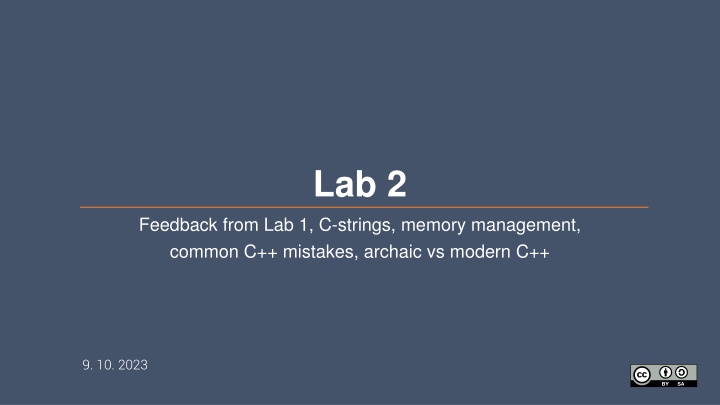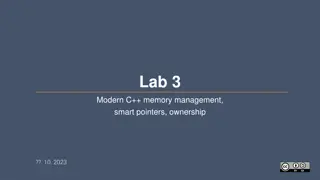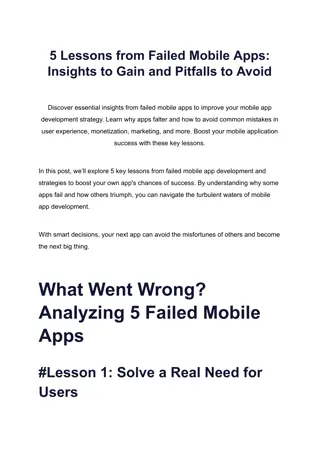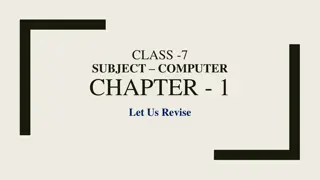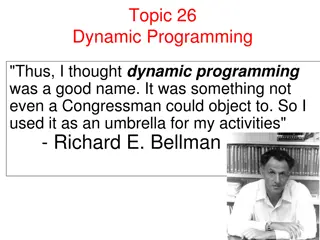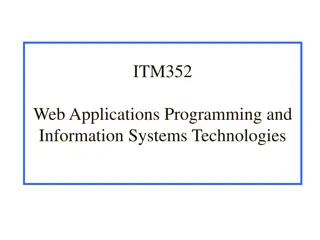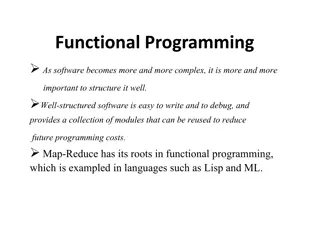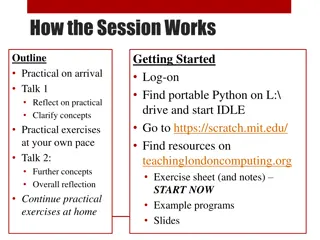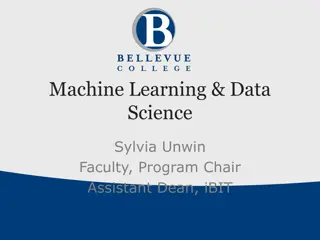Modern C++ Programming Best Practices and Pitfalls: A Comprehensive Overview
Explore the intricacies of modern C++ programming including C-strings, memory management, smart pointers vs. raw pointers, and common mistakes to avoid. Understand the differences between stack and heap allocation, comparing C-strings with std
Download Presentation

Please find below an Image/Link to download the presentation.
The content on the website is provided AS IS for your information and personal use only. It may not be sold, licensed, or shared on other websites without obtaining consent from the author.If you encounter any issues during the download, it is possible that the publisher has removed the file from their server.
You are allowed to download the files provided on this website for personal or commercial use, subject to the condition that they are used lawfully. All files are the property of their respective owners.
The content on the website is provided AS IS for your information and personal use only. It may not be sold, licensed, or shared on other websites without obtaining consent from the author.
E N D
Presentation Transcript
Lab 2 Feedback from Lab 1, C-strings, memory management, common C++ mistakes, archaic vs modern C++ 9. 10. 2023
Outline Feedback from Lab 1 Task 2 introduction Brief overview of C-strings/std::string/std::string_view Brief overview of smart vs raw pointers Pitfalls of using old C++/C constructs Do not use prinft in modern C++ Task 2 coding 2023/2024 2 Programming in C++ (labs)
Lab 1: C++ stack vs heap allocation In contrast to other languages, C++ gives you full control over where your variables are allocated Stack vs heap By default you don't use the new keyword to allocate on the stack. Keyword new allocates on the heap and returns a pointer. In modern C++, new keyword should be avoided Containers or smart pointers shall do allocation. int a; // Stack int* p_a = new int(); // Heap array<int, 3> arr; // Stack array<int, 3>* p_arr = new array<int, 3>(); // Heap string s("Hey"); // Stack string* p_s = new string("Hey"); // Heap 2023/2024 3 Programming in C++ (labs)
Lab 1: Comparing C-strings vs comparing std::strings cout << argv[1] << endl; // --reverse What is going on here? char* ptr compare const char* bool x1 = argv[1] == "--reverse"; // false std::string const char* bool x2 = string(argv[1]) == "--reverse"; // true How to compare C-strings? thanks to std::string on the left, it looks for operator== implementation on std::string No such overload exists, but there is an implicit conversion from const char* to std::string Further reading C function strcmp. ctor const char* -> std::string: https://en.cppreference.com/w/cpp/string/basic_string/basic_string cmp of std::string + std::string: https://en.cppreference.com/w/cpp/string/basic_string/operator_cmp 2023/2024 4 Programming in C++ (labs)
Further reading Lab 1: We used auto&&? https://www.fluentcpp.com/2018/02/06/understanding-lvalues-rvalues-and-their-references/ https://en.cppreference.com/w/cpp/language/value_category lvalue Denotes an object that you can repeatedly access from your program. named variables, array elements, members // Range-based for loop for (auto&& x : xs) cout << x << endl; An lvalue reference (&) binds to an lvalue. int i = 10; int& ri = &i; rvalue If it is not lvalue, then it's rvalue. Denotes an object that cannot be accessed in your code and thus its resources can be reused. Usually, temporary objects! An rvalue reference (&&) binds to an rvalue. MyClass( vector<int>{1, 2 } ) const int& x = foo(); // int foo(); 2023/2024 5 Programming in C++ (labs)
Lab 1: lvalues vs rvalues examples Without the rvalue overload int X = 10; int& hoo() { return X; } int goo() { return 50; } void foo(const vector<int>& xs) { cout << "lvalue" << endl; } vector<int> xs = vector<int>({ 1,2,3 }); foo(vector<int>({ 1,2,3 })); // lvalue, but arg is rvalue foo(xs); // lvalue int i = 42; int& ri = &i; // OK int& rx = &42; // ERROR: expression must be an lvalue With the rvalue overload hoo() = 20; int* p_h = &hoo(); // OK void foo(vector<int>&& xs) { cout << "rvalue" << endl; } void foo(const vector<int>& xs) { cout << "lvalue" << endl; } goo() = 20; // ERROR: '=': left operant must be an lvalue int* p_g = &goo(); // ERROR: expression must be an lvalue vector<int> xs = vector<int>({ 1,2,3 }); rvalue reference overload preferred foo(vector<int>({ 1,2,3 })); // rvalue foo(xs); // lvalue Wait, how is this useful? Performance! Move semantics -> future labs 2023/2024 6 Programming in C++ (labs)
Lab 1: What is auto&& then? Further reading https://www.fluentcpp.com/2021/04/02/what-auto-means/ & is (lvalue) reference && is rvalue reference BUT! auto&& and T&& where T is a template type parameter is a forwarding reference // Range-based for loop for (auto&& x : xs) cout << x << endl; for (const int& x : xs) cout << x << endl; for (int& x : xs) cout << x << endl; for (int x : xs) cout << x << endl; (SIMPLIFICATION) forwarding reference is a special reference that Binds to both rvalues or lvalues Takes the const qualification from the value itself (e.g. if it is const, FR is const too) Use for range-based for loops where you don't care about modifying the items -> concise syntax Later use it in templates 2023/2024 7 Programming in C++ (labs)
Lab 1: Minor things // Reverse iteration over the container for (int i = prefix.size() - 1; i >= 0; i--) { cout << prefix[i] << " "; } Good Decomposition of code to smaller functions ternary if operator <bool expr> ? <true expr> : <false expr> It is an expression and thus it has value. // Using reverse iterators (without C++20 ranges) for (auto it = xs.rbegin(); it != xs.rend(); ++it) cout << *it << endl; // Using C++20 ranges with pipe syntax for (auto&& x : (xs | views::reverse)) cout << x << endl; // Using C++20 ranges without pipes for (auto&& x : ranges::reverse_view(xs)) cout << x << endl; Not ideal Manual indexing to containers One solution used at least checked boundaries xs.at(i) Using C function printf Initialising bool variables with int literal (implicit conversion to bool). #include <stdio.h> Prefer C++ constructs If you really have to, include C libs wrapped in STD namespace -> #include <cstdio> Put tasks from labs (micro-homeworks) into "labs" directory. Naming C++ files with suffixes .cpp, .h, .hpp Modules: .ixx, .cppm, and .cxx 2023/2024 8 Programming in C++ (labs)
Task 2: Binary search tree for strings (old-school) Takes an arbitrary number of ASCII strings from STDIN separated by a newline until the =END= . The program builds a BST from these strings for subsequent searches Case insensitive, no duplicates in the tree. The tree is not guaranteed to be balanced. It does not matter for our cause. After that, the program waits for newline-separated input from STDIN in a loop. Upon getting some input, the program shall find if the string is in the BST. If yes, it shall delete the node and output its value to STDOUT (prefixed with "D: "); otherwise, it shall do nothing. There s a catch though. You must implement it without C++ string and smart pointers. This is (probably) the last time we re using `new` and `C-strings`. 2023/2024 9 Programming in C++ (labs)
Briefly: C-string vs std::string(_view) #include <string> Do not use if not necessary char a[] = "ahoy"; const char* b = "ahoy"; char* c = a; array of char C-string raw pointer to C-string string d("ahoy"); string e(a); string_view g("ahoy"); string_view h(c); string_view i(d); non-owning view 'A' 'h' 'o' 'y' '\0' a 'A' 'A' 'h' 'h' 'o' 'o' 'y' 'y' 'A' 'h' 'o' 'y' '\0' g 4 b c 4 h d 4 i 'A' 'A' 'h' 'h' 'o' 'o' 'y' 'y' e data() size() static RO memory heap stack 2023/2024 Programming in C++ (labs) 10
Briefly: Typical usage of strings and string views implicit conversion std::string -> std::string_view You can concatenate std::strings with operator+ std::string x = a + b + c void foo(string_view s){ .... } string x("ahoy"); string y(x); f(x); f(y); f("ahoy"); string a("Hey"); string b("there"); string s = a + " " + b + "!"; typical usage: std::string ctor with variable/C-string liter l overloaded operator+ for std::string Programming in C++ (labs) 11
Briefly: Smart pointer vs raw pointer Smart pointers They take ownership of their memory seriously and will deallocate once when no one is using the memory. No double frees or memory leaks. They are usually as performant as raw pointers. Whenever possible, use std::unique_ptr -> next lab Raw pointers You may think they take ownership seriously, but they couldn't be bothered. If you don't delete the memory, no one will -> memory leak. If you delete the memory twice, anything can happen (UB). Use them only as non-owning observer pointers 2023/2024 12 Programming in C++ (labs)
What could go wrong? The answer is, almost everything! The worst nightmares of a C++ programmer: Memory leaks unused heap memory on which there wasn t called delete You can go OOM (not Out Of Mana, Out Of Memory) Double frees allocated memory on which there was called delete more than once Undefined Behaviour Dereferencing invalid pointer Segmentation fault or you read garbage data and may not notice. Reading uninitialized memory You re using garbage data but it is not always obvious. Buffer overflows C arrays/C-strings have no bounds checking and will let you write outside of it without even blinking Memory corruption - Accidently rewriting bytes of your other structures. Working with garbage data and now knowing is These problems are real https://msrc.microsoft.com/blog/2019/07/a-proactive-approach-to-more-secure-code/ https://www.chromium.org/Home/chromium-security/memory-safety/ ~70% of serious bugs is related to memory management 2023/2024 13 Programming in C++ (labs)
What about C-strings and printf? Yes, C-string functions are very unsafe and there is always some UB waiting around the corner. Invalid null termination char str[5]; str[0] = 'H ; str[1] = 'i'; // Forgot to null-terminate // Any operation expecting null-termination is UB Going past the null terminating byte char str[] = "hello"; for(int i = 0; i <= 10; ++i) { char c = str[i]; // Undefined behavior when i > 5 } Unmatching buffer sizes char dest[5]; strncpy(dest, "hello, world", 12); // No space for null-terminator Unsafe printf Illegal format string Not enough arguments for format specifier printf("%d %s\n", 10); // UB, missing arguments printf("%d", 3.14f); // UB,conversion specification is invalid 2023/2024 14 Programming in C++ (labs)
Modern C++ for the rescue! The good news is that modern C++ can help with these. The worst nightmares of a C++ programmer: Memory leaks & double frees smart pointers Dereferencing invalid pointer smart pointers + observer pointers The observer pointers are still dangerous if the programmer is not cautious. Reading uninitialized memory containers Containers do not force us to initialize, but at least give us an easy interface to do so. Buffer overflows containers & iterators Memory corruption - containers & iterators raw arrays do not know their size, containers do know! Missing null string termination std::string is not null-terminated, it knows the size Going past the null terminating byte Not possible if using iterators. Unmatching buffer sizes The copying is handled by the library-defined operators. Unsafe printf Much harder to mess something with std::cout , std::format(C++20), and std::print(C++23) Additionally, you get very nice and unified interface and utility functions on those classes std::string contains, starts_with, ends_with, (r)find, operator+ unique_ptr, shared_ptr they behave almost like drop-in replacements for raw pointers 2023/2024 15 Programming in C++ (labs)
Task 2: Let's code Takes an arbitrary number of ASCII strings from STDIN separated by a newline until the =END= . The program builds a BST from these strings for subsequent searches Case insensitive, no duplicates in the tree. The tree is not guaranteed to be balanced. It does not matter for our cause. After that, the program waits for newline-separated input from STDIN in a loop. Upon getting some input, the program shall find if the string is in the BST. If yes, it shall delete the node and output its value to STDOUT (prefixed with "D: "); otherwise, it shall do nothing. There s a catch though. You must implement it without C++ string and smart pointers. Hints: #include <cstring>, str(n)cpy, str(n)cat, strlen, str(n)cmp 2023/2024 16 Programming in C++ (labs)
Code: The problem approach BST is a binary tree (no duplicates). Rooted, each node has at most two children (left, right). For each node: The left subtree contains only smaller items. The right subtree contains only greater items. hey jude, don t make it bad. =end= hey Strings in C/C++ use lexicographical ordering. Beware that you must have the same case to achieve alphabetical ordering! E.g. "B" < "a" < "b" don t jude, make it bad. Further reading https://en.wikipedia.org/wiki/Binary_search_tree https://pruvodce.ucw.cz/ (kapitola Bin rn vyhled vac stromy) 2023/2024 17 Programming in C++ (labs)
Code: Represent the nodes & edges struct Node Node* p_left Node* p_right char* data We will traverse it from the root The whole tree is represented by the root Node hey jude, don t make it bad. =end= hey Node* don t jude, make it bad. struct Node stack heap This is not accurate the C-strings in the nodes are allocated somewhere else on the heap as well hey data Node* 2023/2024 18 Programming in C++ (labs)
Intermezzo: type specifier auto since C++11 No dynamic types! All types must be known at compile time! The keyword auto just says "Please compiler, just deduce the type for me" E.g. based on the expression on the right Necessary to define the type of lambdas (later labs ) The compilers get more powerful with their deduction capabilities over time. Saves you keystrokes! // Without auto vector<map<size_t, unique_ptr<double>>> names; vector<map<size_t, unique_ptr<double>>>::iterator it = names.begin(); // With auto vector<map<size_t, unique_ptr<double>>> names; auto it = names.begin(); Further reading https://en.cppreference.com/w/cpp/language/auto 2023/2024 19 Programming in C++ (labs)
Intermezzo: nullptr since C++11 Since C++11 we have the nullptr keyword. It represents a null/invalid pointer but has the correct pointer type. Readability Type safety Use it to represent invalid/null pointers. Avoid C approaches - 0 (int) or NULL (preprocessor define) Further reading https://www.modernescpp.com/index.php/the-null-pointer-constant-nullptr/ https://en.cppreference.com/w/cpp/language/nullptr 2023/2024 20 Programming in C++ (labs)
Intermezzo: tuple/pair since C++11 #include <tuple> Heterogeneous container with known size at compile-time. pair<bool, double> p(false, 3.6); tuple<int, float, char> t(10, 20.0f, 'x'); p.first; // first item, not method! p.second; // second item, not method! // since C++17 tuple<int, float, char> foo() { return tuple(10, 20.0f, 'x'); } get<0>(p); // first item get<1>(p); // second item Stronger type deduction get<0>(t); // first item get<1>(t); // second item get<1>(t); // third item get<3>(t); // ERROR: Compile-time check // since C++11 tuple<int, float, char> foo() { return make_tuple(10, 20.0f, 'x'); } Helper functions, make_* Further reading https://en.cppreference.com/w/cpp/utility/tuple 2023/2024 21 Programming in C++ (labs)
Intermezzo: structured bindings since C++17 Simple way to unpack tuple-like, array or struct types. // Array int a[2] = {1, 2}; auto [x, y] = a; // x == 1, y == 2 auto& [xr, yr] = a; // xr refers to a[0], yr refers to a[1] Other languages may call this unpacking, deconstructing, destructuring // Tuple-like tuple<float, char, int> tpl(0.2f, 'a', 42); auto [a, b, c] = tpl; auto& [ar, br, cr] = tpl; With existing variables, you can fill them with std::tie // Existing variables int a = 0; double b = 0.0; char c = ' '; // Struct types struct S { int x1; double y1; }; // Some tuple tuple<int, double, char> t = make_tuple(42, 3.14, 'x'); S f() { return S{ 1, 2.3 }; } // Unpack the tuple into existing variables tie(a, b, c) = t; auto [i, j] = f(); const auto& [icr, rcr] = f(); auto& [ir, jr] = f(); // Invalid Further reading https://en.cppreference.com/w/cpp/language/structured_binding https://devblogs.microsoft.com/oldnewthing/20201014-00/?p=104367 2023/2024 22 Programming in C++ (labs)
Intermezzo: std::optional since C++17 #include <optional> Type representing a value of type T OR nothing/null/no value optional<string> create(bool b) { if (b) return "Godzilla"; return nullopt; } Use for types, where "empty" is a valid state cout << "create(false) returned " << create(false).value_or("empty") << endl; cout << "create(false) returned " << *create(false) << endl; // UB, cannot get the value // True if optional is not null if (auto str = create(true)) cout << "create2(true) returned " << *str << endl; Further reading https://en.cppreference.com/w/cpp/utility/optional 2023/2024 23 Programming in C++ (labs)
Code: Print tree Prints all the values in their order It means, in order if you scan from left to right in symmetric tree hey jude, don t make it bad. =end= print_tree(p_root) print_tree(p_root->left) print(p_root->val) print_tree(p_root->right) hey Node* don t jude, make it bad. struct Node stack heap You can concatenate std::vectors with xs.insert() vector<int> a({ 1, 2, 3 }); vector<int> b({ 3, 4, 5 }); // Taking copies a.insert(a.end(), b.begin(), b.end()); // With move semantics a.insert(a.end(), make_move_iterator(b.begin()), make_move_iterator(b.end())); 2023/2024 24 Programming in C++ (labs)
Code: Building the tree hey jude, don t make it bad. =end= In a loop reading STDIN until line "=END=" We start with Node* tree = nullptr With each word, allocate Node with new and attach it smaller -> go/attach left greater -> go/attach right Compare C-strings with strcmp hey Node* don t jude, // Convert ASCII string to lowercase string s("HeLlO!"); for (char& c : s) c = tolower(static_cast<unsigned char>(c)); make it bad. struct Node stack heap Parameter of tolower must be representable by unsigned char char can be both signed or unsinged (impl-defined) unsigned char, signed char uint8_t, int8_t 2023/2024 25 Programming in C++ (labs)
Code: Delete operation Find what to delete with a pointer to the parent with "am I left/right child" indicator DRY Don't repeat yourself hey jude, don t make it bad. =end= hey Find a successor of a node with a pointer to the parent with "am I left/right child" indicator Node* don t jude, make it bad. struct Node stack heap 2023/2024 26 Programming in C++ (labs)
Code: Finding node's direct predecessor / successor hey jude, don t make it bad. =end= hey Predecessor: The maximum from the left subtree The "rightest" node in the left subtree Successor: The minimum from the right subtree The "leftest" node in the right subtree hey Node* don t jude, make it bad. struct Node stack heap 2023/2024 27 Programming in C++ (labs)
Code: Deleting the node https://en.wikipedia.org/wiki/Binary_search_tree#Deletion hey jude, don t make it bad. =end= make Case 1: Delete leaf node find(D) p_d_par->right/left = nullptr hey Node* p_d_par don t jude, jude, jude, make it bad. struct Node stack heap make p_d Watch out for case where p_d_par is nullptr (deleting root) 2023/2024 28 Programming in C++ (labs)
Code: Deleting the node https://en.wikipedia.org/wiki/Binary_search_tree#Deletion hey jude, don t make it bad. =end= don't Case 2: Delete node with one child find(D) p_d_par->left/right = p_s hey p_d p_d_par Node* don t don t jude, bad. p_s make it bad. struct Node bad. stack heap Watch out for case where p_d_par is nullptr (deleting root) 2023/2024 29 Programming in C++ (labs)
Code: Deleting the node https://en.wikipedia.org/wiki/Binary_search_tree#Deletion hey jude, don t make it bad. =end= hey Case 3: Delete node with two children Find successor S, swap with D, remove successor Successor always has just one child hey Node* hey don t jude, it make it bad. jude, jude, struct Node don t stack heap don t it nullptr nullptr 2023/2024 30 Programming in C++ (labs)
Code: Deleting the node https://en.wikipedia.org/wiki/Binary_search_tree#Deletion 1. 2. 3. Swap contents of S and D if p_s_par != p_d: p_s_par->left = p_s->right else: p_s_par->right = p_s->right hey jude, don t make it bad. =end= hey p_d p_d_par hey Node* don t jude, make it bad. struct Node p_s stack heap p_s_par 2023/2024 31 Programming in C++ (labs)
Code: Deleting the node Do not forget to deallocate (delete)! Memory leaks But only once per allocated pointer! Double free hey jude, don t make it bad. =end= hey Node* don t jude, make it bad. struct Node stack heap 2023/2024 32 Programming in C++ (labs)
Code: Example inputs & outputs hey jude, don t make it bad. =end= it it nothing bad bad. 1 2 3 4 5 =end= 5 4 3 2 1 D: it D: bad. D: 5 D: 4 D: 3 D: 2 D: 1 2023/2024 33 Programming in C++ (labs)
Lab 2: Wrap up Manual memory management is problematic! Modern C++ helps with that (-> next lab). C-strings (char*) are still all over the place, and we should get rid of them ASAP. The printffunction is loved by many, but it s time to say goodbye. Do not repeat yourself -> good decomposition and avoid copy-paste Memory leak, double free, dereferencing invalid pointer, uninitialized memory, buffer overflows. Next lab: We ll write the same program, but this time using modern C++. Your tasks until the next lab: Task 2 (24h before, so I can give feedback). Just a directory lab_02 with one CPP file will do Feel free to deliver the whole project with some build system (CMake, make) 2023/2024 34 Programming in C++ (labs)
